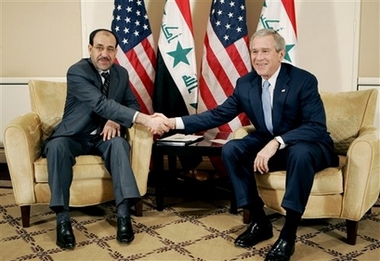Bush, Iraqi PM al-Maliki meet in Jordan
(AP)Updated: 2006-11-30 14:26
The memo recommended steps to strengthen the Iraqi leader's position, including possibly sending more troops to defend Baghdad and providing monetary support for moderate political candidates for Iraq's parliament.
|
The Iraqi prime minister also faced political turmoil at home about the summit.
Thirty Iraqi lawmakers and five cabinet ministers loyal to anti-American cleric Muqtada al-Sadr said they were boycotting Parliament and the government to protest al-Maliki's presence at the summit.
The president was expected to ask the embattled Iraqi prime minister how to train Iraqi forces so they can more quickly shoulder more responsibility for halting the sectarian violence and, specifically, mending a gaping Sunni-Shi'ite divide. There are about 140,000 US troops in Iraq, and Bush is under unrelenting pressure from Democrats and many Republicans to start bringing them home.
Some analysts suggested that, by showing distance between al-Maliki and Bush, the memo might actually help the Iraqi leader more than damage him.
Jon Alterman, former special assistant secretary of state for Near Eastern affairs, said the memo's doubts about al-Maliki "seemed calculated to steel his spine."
"This memo reads to me more like a memo to Prime Minister al-Maliki than to President Bush," said Alterman, now with the Center for Strategic and International Studies. "It has his entire to-do list as well as a list of what he'll get if he agrees."
In Washington, Sen. Jack Reed, D-R.I., called on Bush to appoint a high-ranking special envoy to work with the Iraqi government on disbanding militias, including all Iraq's factions in the nation's political process and equitably distributing resources such as oil revenue.
"Steps have to be taken now," he said.
Bush's meeting with al-Maliki is part of a new flurry of diplomacy the administration has undertaken across the Middle East. Hadley's memo suggests that Secretary of State Rice should hold a meeting for Iraq and its neighbors in the region early next month and also that the US could step up efforts to get Saudi Arabia to help. It was written just weeks before Vice President Dick Cheney was dispatched to Saudi Arabia.
Senior administration officials, speaking on the condition of anonymity because the document is still classified even though published, said that many of the concerns raised by Hadley have been or are being rectified in the month that has passed since his trip to Baghdad.
 | 1 | 2 | 3 |
|
||
|
||
|
|

